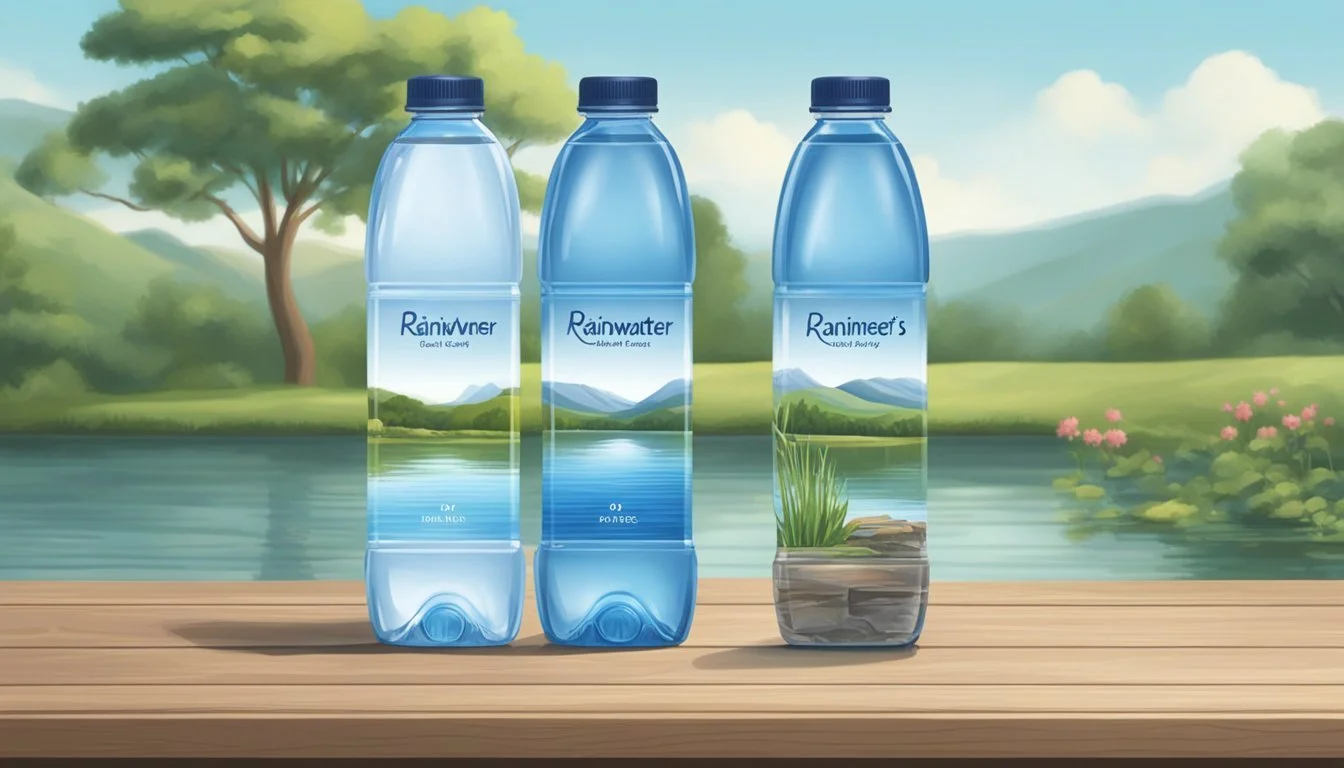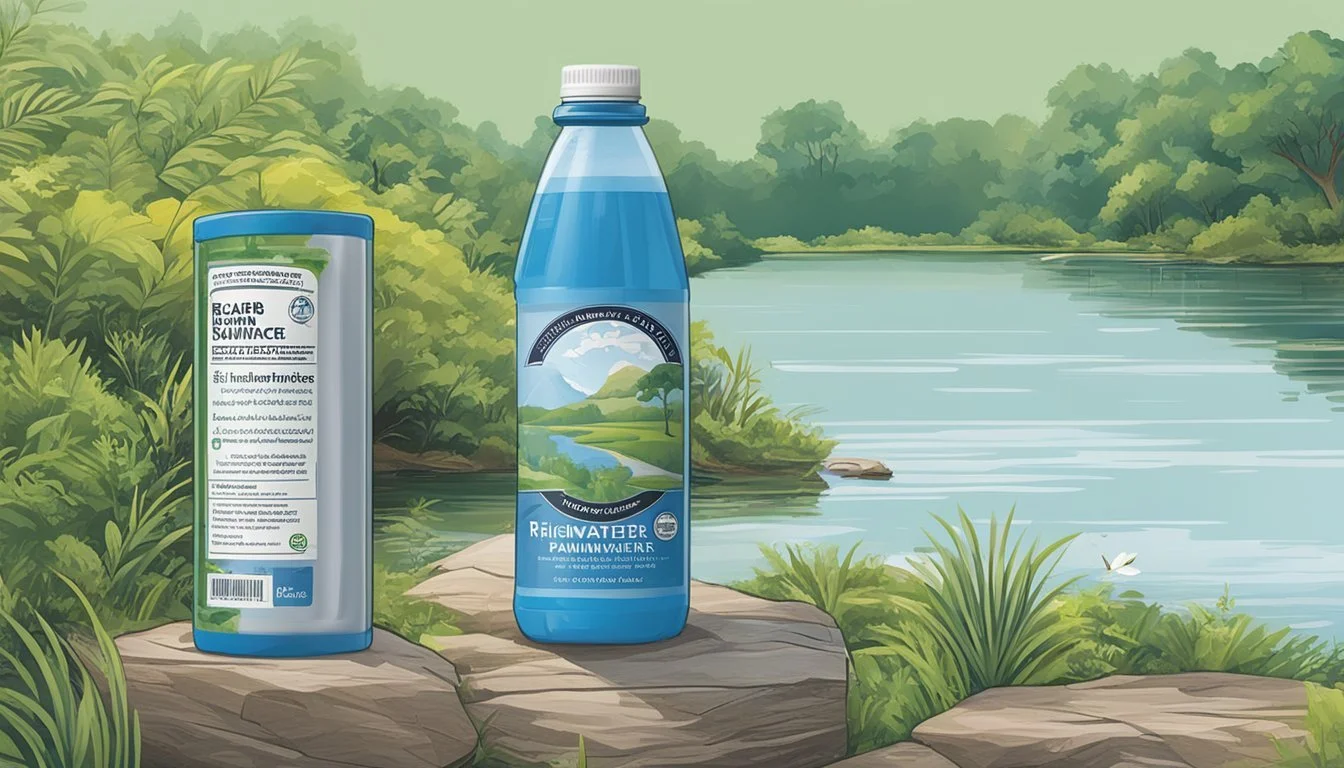Richard’s Rainwater vs. Open Water
Comparing Quality and Taste
In the age of eco-conscious consumption, Richard's Rainwater and Open Water are leading names in the bottled water industry. Richard's Rainwater stands out by collecting rain before it hits the ground, ensuring a pure and renewable source of drinking water. This innovative approach makes it the first net-positive bottled water, producing more water than it consumes. Meanwhile, Open Water has carved its niche with aluminum cans, offering a sustainable alternative to plastic bottles and emphasizing the importance of reducing plastic waste.
Both brands are committed to environmental sustainability, but they take different paths. Open Water focuses on the reduction of plastic pollution with easily recyclable aluminum packaging. In contrast, Richard's Rainwater highlights its virtually zero-waste filtration system, capturing and purifying rainwater to provide an untouched, pristine water source.
When comparing the experience, each offers unique advantages. Richard's Rainwater promises a fresh taste derived from rainwater's natural purity, while Open Water leverages its eco-friendliness and practicality. Ultimately, the choice between Richard’s Rainwater and Open Water depends on whether you prioritize innovative water sourcing or sustainable packaging. By exploring what each brand brings to the table, you can make an informed decision that aligns with your values in drinking water.
Brand Overviews
Richard’s Rainwater and Open Water both offer distinctive approaches to bottled water, focusing on sustainability, unique sourcing methods, and eco-friendly packaging.
Richard's Rainwater Profile
Richard’s Rainwater originates from rainwater collection. The brand emphasizes sustainability and eco-friendliness. Richard Heinichen, the founder, utilizes a proprietary filtration system to ensure the water is pure and clean.
Richard's Rainwater boasts a neutral pH and is sold in recyclable aluminum bottles. The brand is available at Whole Foods, H-E-B, Central Market, and Amazon. This approach not only reduces the carbon footprint but also ensures water availability exceeds traditional municipal sources. Richard’s Rainwater avoids mineral enrichment, keeping it free from additional elements, thus reflecting its commitment to offering a pure water experience.
Open Water Insights
Open Water focuses on sustainability, offering purified water in recyclable aluminum packaging. This approach reduces plastic waste and lowers the brand’s carbon footprint.
Open Water sources its water from municipal supplies, which is then purified to ensure high standards. Available at Kroger, Sprouts, and Amazon, Open Water's distribution emphasizes accessibility and convenience. The brand’s commitment to eco-friendliness extends to its entire production process, reinforcing its image as a leader in sustainable bottled water options. By prioritizing recyclable materials, Open Water contributes significantly to environmental conservation.
Environmental Considerations
When evaluating Richard’s Rainwater and Open Water, it’s crucial to explore their environmental footprints, including the impact on ecosystems, packaging materials, and the sustainability of their water sourcing methods. Differences in these areas can significantly influence the net-positive impact each brand offers.
Impact on Ecosystem
Richard’s Rainwater uses decentralized rainwater collection sites. This practice minimizes strain on local water resources and reduces the environmental impact. Collecting water directly from rainfalls helps maintain a balance in natural water cycles.
Open Water, on the other hand, uses a more traditional bottled water approach. While efforts are made to reduce environmental impact, the extraction process can sometimes disrupt local ecosystems. This can lead to depletion of local water sources and cause habitat changes for wildlife.
Packaging Materials
Richard’s Rainwater primarily uses easily recyclable glass bottles and aluminum cans. These materials are not only recyclable but also have high reuse rates compared to plastic. Glass is highly durable and can be recycled endlessly without loss of quality, while aluminum cans are also recyclable and require less energy to produce new cans from recycled material.
Open Water exclusively uses aluminum cans for packaging. Aluminum is lightweight, making transportation more efficient and reducing carbon emissions. Additionally, aluminum recycling is highly effective, with a significant reduction in the need for extracting new raw materials.
Water Sourcing and Renewability
Richard’s Rainwater sources its water from natural rainfalls. This method makes rainwater a highly renewable and sustainable drinking water source. By capturing water that would otherwise contribute to runoff, they ensure a consistent and eco-friendly supply.
Open Water often sources from groundwater and surface water, requiring more extensive filtration. While Open Water strives to implement sustainable practices, their reliance on these sources may not always renew as quickly as rainwater. Thus, rainwater’s direct-from-clouds approach offers a notable advantage in renewability.
The brands’ different approaches highlight their commitment to sustainable practices, but their methods present varying impacts on the environment. Understanding these can help key stakeholders make informed decisions about their preferred brand based on environmental considerations.
Product Offerings
Richard’s Rainwater and Open Water offer distinct types of bottled water products that cater to different preferences in terms of purity and environmental sustainability.
Varieties of Water
Richard’s Rainwater harvests rain directly, producing pure, clean drinking water. It offers still and sparkling varieties. Sparkling Rainwater has a distinct taste due to its effervescence. Richard's Rainwater emphasizes minimal mineral content, ensuring a refreshing experience.
Open Water provides still and sparkling options as well, with a focus on sustainability. Their water is made from purified municipal sources and undergoes a rigorous filtration process, including reverse osmosis. This ensures high-quality water regardless of mineral content.
Availability and Accessibility
Richard's Rainwater is widely available at Whole Foods, Kroger, Albertsons, and Natural Grocers. In addition to brick-and-mortar stores, it can also be found online via Amazon. Speciality shops and independent grocers also carry this brand, enhancing its accessibility.
Open Water is available at major retailers like Sprouts and Whole Foods Market. Consumers can use their store locator on the company’s website for easy access. Online availability through Amazon further expands its reach. This widespread distribution ensures that customers can purchase Open Water in a variety of locations.
Both brands have strong retail partnerships and online presence, making them convenient choices for consumers seeking clean, premium bottled water.
Health and Quality Standards
When choosing bottled water, health and quality are critical considerations. Richard’s Rainwater and Open Water both offer unique features in their filtration and purification processes, as well as compliance with safety and regulatory standards.
Filtration and Purification
Richard's Rainwater employs a proprietary filtration system that catches rain before it hits the ground. This method ensures an exceptionally high level of purity since contaminants are minimized from the start. Rainwater bypasses common pollutants found in municipal water sources, leading to cleaner water.
Their process avoids the need for chemicals like chlorine, fluoride, or ammonia. This leaves the water more natural and can be beneficial for those sensitive to additives. Additionally, it maintains essential minerals such as calcium and magnesium which contribute to taste and health benefits.
Open Water utilizes an advanced purification process that includes multiple filtration stages to remove impurities. These stages often involve reverse osmosis, UV purification, and mineral re-addition to ensure high-quality standards. This multi-step method ensures any remaining particulates or contaminants are eliminated, resulting in safe and clean bottled water.
Safety and Regulations
Both Richard's Rainwater and Open Water adhere to stringent bottled water standards set by regulatory bodies. Richard's Rainwater is particularly notable for achieving over 100 times cleaner results than the strictest bottled water standards without additional chemicals. This highlights their commitment to safety and health.
Open Water also meets rigorous safety standards, ensuring their water is as pure as possible. They perform regular testing to comply with bottled water standards and exceed typical municipal water quality. This dedication to safety ensures that consumers receive water that is not only pure but also free from harmful contaminants.
By focusing on thorough and natural purification methods, and adhering to high regulatory standards, both brands demonstrate a strong commitment to delivering safe and high-quality bottled water.
Taste and Consumer Preference
When comparing Richard’s Rainwater and Open Water, it’s essential to evaluate taste and consumer preference. These factors can significantly influence purchasing decisions and overall satisfaction.
Sensory Evaluation
Richard’s Rainwater is known for its buttery clean taste. The water undergoes a proprietary, virtually zero-waste filtration system, which highlights its purity. This results in a soft and refreshing mouthfeel, making it appealing for those seeking a clean-tasting hydration option.
Open Water, in contrast, carries a taste profile often described as crisp and mineral-rich. Packaged in 100% recyclable aluminum bottles and cans, its flavor is influenced by added minerals, giving it a slightly alkaline finish. This may cater to consumers who prefer a water with distinct taste characteristics.
Consumer Testimonials
Consumers frequently share their opinions on platforms like Facebook, Twitter, and Instagram. Reviews for Richard’s Rainwater often praise its refreshing and pure taste. Many appreciate the sustainability aspect, combining clean flavor with environmental responsibility.
Open Water also garners strong testimonials for its taste. Customers favor the crisp, mineral-rich profile and appreciate the recyclable packaging. Social media mentions often highlight the smooth hydration experience, making it a popular choice among eco-conscious consumers.
Between taste and consumer feedback, both brands have their unique strengths, appealing to different segments of the bottled water market.
Market Presence and Social Proof
Richard’s Rainwater and Open Water have distinct market presences and various forms of social proof that set them apart in the competitive bottled water industry.
Online and Offline Retailers
Richard’s Rainwater is available at numerous premium retailers such as Whole Foods Market, Central Market, and H-E-B. It can also be found at popular locales like premier restaurants, bars, hotels, and coffee shops. Their strong footprint in these venues indicates a widespread acceptance and trust in their product quality.
Open Water, on the other hand, emphasizes a broad reach through online platforms and supermarkets. Their products are prominently featured on Amazon, and retailers like Albertsons often stock their lines. This gives them a significant advantage in terms of accessibility, appealing to a tech-savvy, convenience-oriented consumer base.
Corporate Partnerships
Richard’s Rainwater has cultivated partnerships with high-profile establishments such as Faubourg Brewing Co. in New Orleans. Such associations bolster the brand’s credibility and visibility in local markets. They also collaborate with hospitality sectors, ensuring their presence in curated dining and lodging experiences.
Open Water engages in partnerships that align with their environmental mission. They collaborate with businesses focused on sustainability, enhancing their reputation as a green company. These partnerships not only increase their market reach but also solidify their commitment to eco-friendly practices, appealing to environmentally conscious consumers.
Future Trends and Opportunities
Richard’s Rainwater and Open Water are positioned to capitalize on significant trends in sustainable practices and technological innovations in the bottled water industry. Key growth areas include advancements in water purification and increased consumer demand for eco-friendly products.
Innovation in Water Systems
Richard’s Rainwater uses a proprietary zero-waste filtration system to remove contaminants from collected rainwater, making it potable. This decentralized approach allows for collection at various sites, reducing the carbon footprint associated with transporting water.
Open Water focuses on sustainability too by using highly recyclable aluminum bottles, which are lighter and have a smaller environmental impact compared to plastic. Both companies are investing in innovative eco-friendly packaging and renewable sources to meet increasing consumer demand for sustainable products.
Industry Growth Projections
The bottled water industry is expected to see substantial growth, driven by rising awareness of environmental issues and consumer preference for healthier options. Richard’s Rainwater projects to harvest over 4 million gallons in the upcoming years, generating significant sales in markets like Louisiana and beyond.
Consumer trends are favoring brands that emphasize sustainable practices and eco-friendly initiatives. Open Water, led by CEO Sarah Karger, is positioned to capture market share with its commitment to reducing plastic waste and delivering potable water in environmentally responsible packaging.
Both companies aim to scale up their decentralized rainwater collection sites to accommodate growing demand while maintaining their commitment to sustainability and renewable sources. This strategic approach not only supports industry growth but also aligns with global environmental goals.
More About Richard’s Rainwater
Acqua Pana vs Richard's Rainwater: Which Bottled Water is Better?
Alkaline88 vs Richard's Rainwater: Which Bottled Water is Better?
Antipodes vs Richard's Rainwater: Which Bottled Water is Better?
Aqua Carpatica vs Richard's Rainwater: Which Bottled Water is Better?
Aquafina vs Richard's Rainwater: Which Bottled Water is Better?
Arrowhead vs Richard's Rainwater: Which Bottled Water is Better?
Boxed Water vs Richard's Rainwater: Which Bottled Water is Better?
Cascade Mountain vs Richard's Rainwater: Which Bottled Water is Better?
Castle Rock vs Richard's Rainwater: Which Bottled Water is Better?
Cirro vs Richard's Rainwater: Which Bottled Water is Better?
Core Hydration vs Richard's Rainwater: Which Bottled Water is Better?
Crystal Geyser vs Richard's Rainwater: Which Bottled Water is Better?
Deer Park vs Richard's Rainwater: Which Bottled Water is Better?
Erewhon vs Richard's Rainwater: Which Bottled Water is Better?
Essentia vs Richard's Rainwater: Which Bottled Water is Better?
Eternal vs Richard's Rainwater: Which Bottled Water is Better?
Ethos vs Richard's Rainwater: Which Bottled Water is Better?
Evian vs Richard's Rainwater: Which Bottled Water is Better?
Hawaii Volcanic vs Richard's Rainwater: Which Bottled Water is Better?
Hawaiian Springs vs Richard's Rainwater: Which Bottled Water is Better?
Ice Mountain vs Richard's Rainwater: Which Bottled Water is Better?
Icelandic Glacial vs Richard's Rainwater: Which Bottled Water is Better?
Just Water vs Richard's Rainwater: Which Bottled Water is Better?
Kroger vs Richard's Rainwater: Which Bottled Water is Better?
LIFEWTR vs Richard's Rainwater: Which Bottled Water is Better?
Liquid Death vs Richard's Rainwater: Which Bottled Water is Better?
Mananalu vs Richard's Rainwater: Which Bottled Water is Better?
Mountain Valley Spring Water vs Richard's Rainwater: Which Bottled Water is Better?
Nestle Pure Life vs Richard's Rainwater: Which Bottled Water is Better?
Origin vs Richard's Rainwater: Which Bottled Water is Better?
Ozarka vs Richard's Rainwater: Which Bottled Water is Better?
Penta vs Richard's Rainwater: Which Bottled Water is Better?
Perrier vs Richard's Rainwater: Which Bottled Water is Better?
Poland Spring vs Richard's Rainwater: Which Bottled Water is Better?
Purely Sedona vs Richard's Rainwater: Which Bottled Water is Better?
Richard's Rainwater vs 1907water: Which Bottled Water is Better?
Richard's Rainwater vs 7-Select: Which Bottled Water is Better?
Richard's Rainwater vs Action: Which Bottled Water is Better?
Richard's Rainwater vs Big Chill: Which Bottled Water is Better?
Richard's Rainwater vs Big Win: Which Bottled Water is Better?
Richard's Rainwater vs BodyArmor: Which Bottled Water is Better?
Richard's Rainwater vs CBD Living: Which Bottled Water is Better?
Richard's Rainwater vs Crystal Lake: Which Bottled Water is Better?
Richard's Rainwater vs Dasani: Which Bottled Water is Better?
Richard's Rainwater vs Essence pH10: Which Bottled Water is Better?
Richard's Rainwater vs HFactor: Which Bottled Water is Better?
Richard's Rainwater vs Kirkland Signature: Which Bottled Water is Better?
Richard's Rainwater vs Ophora: Which Bottled Water is Better?
Richard's Rainwater vs Proud Source: Which Bottled Water is Better?
Richard's Rainwater vs Pure Life: Which Bottled Water is Better?
Richard's Rainwater vs Ramona: Which Bottled Water is Better?
Richard's Rainwater vs Refreshe: Which Bottled Water is Better?
Richard's Rainwater vs Simple Truth: Which Bottled Water is Better?
Richard's Rainwater vs Skyra: Which Bottled Water is Better?
Richard's Rainwater vs Talking Rain AQA: Which Bottled Water is Better?
Richard's Rainwater vs The Well: Which Bottled Water is Better?
Richard's Rainwater vs Weird Water: Which Bottled Water is Better?
Richard's Rainwater vs Whole Foods 365: Which Bottled Water is Better?
Richard's Rainwater vs Zenwtr: Which Bottled Water is Better?
San Pellegrino vs Richard's Rainwater: Which Bottled Water is Better?
Smartwater vs Richard's Rainwater: Which Bottled Water is Better?
Solan de Cabras vs Richard's Rainwater: Which Bottled Water is Better?
Starkey vs Richard's Rainwater: Which Bottled Water is Better?
Tahoe vs Richard's Rainwater: Which Bottled Water is Better?
Topo Chico vs Richard's Rainwater: Which Bottled Water is Better?
Tru Alka vs Richard's Rainwater: Which Bottled Water is Better?
Volvic vs Richard's Rainwater: Which Bottled Water is Better?
Waiakea vs Richard's Rainwater: Which Bottled Water is Better?
Whole Foods Italian Still Mineral water vs Richard's Rainwater: Which Bottled Water is Better?
Zephyrhills vs Richard's Rainwater: Which Bottled Water is Better?
More About Open Water
Aqua Carpatica vs Open Water: Which Bottled Water is Better?
Cascade Mountain vs Open Water: Which Bottled Water is Better?
Core Hydration vs Open Water: Which Bottled Water is Better?
Crystal Geyser vs Open Water: Which Bottled Water is Better?
Hawaii Volcanic vs Open Water: Which Bottled Water is Better?
Hawaiian Springs vs Open Water: Which Bottled Water is Better?
Icelandic Glacial vs Open Water: Which Bottled Water is Better?
Mountain Valley Spring Water vs Open Water: Which Bottled Water is Better?
Nestle Pure Life vs Open Water: Which Bottled Water is Better?
Open Water vs Kirkland Signature: Which Bottled Water is Better?
Open Water vs Whole Foods 365: Which Bottled Water is Better?
San Pellegrino vs Open Water: Which Bottled Water is Better?
Solan de Cabras vs Open Water: Which Bottled Water is Better?
Talking Rain AQA vs Open Water: Which Bottled Water is Better?
Whole Foods Italian Still Mineral water vs Open Water: Which Bottled Water is Better?







